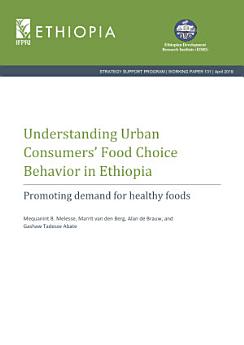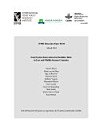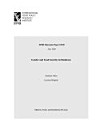Understanding urban consumers’ food choice behavior in Ethiopia: Promoting demand for healthy foods
Melesse, Mequanint B. · Van den berg, Marrit · de Brauw, Alan · Abate, Gashaw T.
Apr 2019 · ESSP Working Paper Book 131 · Intl Food Policy Res Inst
5.0star
1 reviewreport
Ebook
33
Pages
family_home
Eligible
info
reportRatings and reviews aren’t verified Learn More
About this ebook
Using survey data collected from 996 representative households in Addis Ababa, Ethiopia, this paper documents several insights to help understand urban consumer food purchasing and consumption choices. The findings can be summarized as follows: 1) We find that households face important dietary gaps; a large proportion eats insufficient amounts of nutrient-dense vegetables, animal-source foods, and fruits. 2) The consumption of ultra-processed foods increases with income and may become a pressing health concern as incomes rise. 3) From a purchasing perspective, we find that consumers buy foods for different purposes at different outlets. Nearby kiosks and informal street markets are frequented for small food items and for fruits and vegetables, while formal open markets and consumer cooperatives are used for bulky food items. 4) Respondents make food and food outlet choices based on their health and food safety concerns, but few consider the nutritional value of food when purchasing it. Concurrently, the availability of a wide variety of healthy and safe foods is highly valued by most respondents for outlet choice. Among consumers in lower income categories, they tend to make food and food outlet choices based on prices and location convenience. 5) Although nutrition is not a primary concern when making choices about food, consumers appear to have reasonable nutritional knowledge. Most respondents considered a healthy diet to be primarily plant-based. Most people are aware that they should eat more fruits and vegetables and less sugary, fatty, and salty foods, but they have limited knowledge on the nutrient content of specific foods and the causes of obesity. 6) Labelling would not be an effective way to increase nutritional knowledge; most respondents have limited understanding of the information that labels provide. Rather, most respondents trust the information provided by health professionals over other sources. In sum, these results are potentially relevant for policy and the design of future programs for improving nutritional outcomes through enhanced diets.
Ratings and reviews
5.0
1 review
Anil Das
- Flag inappropriate
September 20, 2023
AAA BOSS NETWORK
About the author
Rate this ebook
Tell us what you think.
Reading information
Smartphones and tablets
Install the Google Play Books app for Android and iPad/iPhone. It syncs automatically with your account and allows you to read online or offline wherever you are.
Laptops and computers
You can listen to audiobooks purchased on Google Play using your computer's web browser.
eReaders and other devices
To read on e-ink devices like Kobo eReaders, you'll need to download a file and transfer it to your device. Follow the detailed Help Center instructions to transfer the files to supported eReaders.









